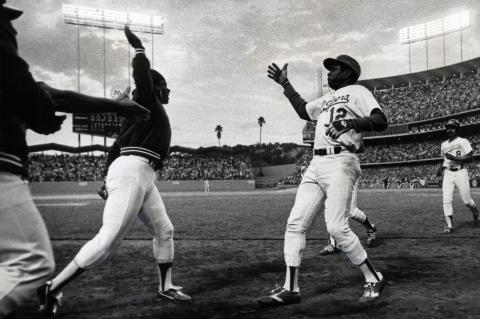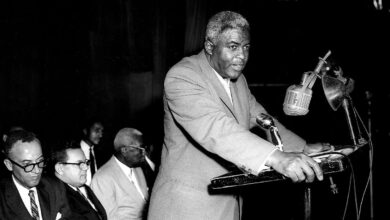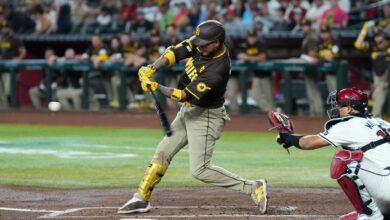


On the final day of the 1977 regular season, the Los Angeles Dodgers had almost nothing to play for. They did, however, have a chance to make history.
The Dodgers already had clinched the National League West title, thus ending the reign of Cincinnati’s Big Red Machine. They also knew their opponent in the best-of-five playoffs would be the Philadelphia Phillies. There was only the matter of ending the regular season at home on a Sunday afternoon.
The Dodgers had three players — Reggie Smith, Steve Garvey, and Ron Cey — with 30 or more homers on the season. In addition, Dusty Baker was sitting on 29 homers, and if he could hit one more it would be the first time in history where a team had four such players.
There were 46,000 fans in Dodger Stadium that day, hoping to see history made. But the Dodgers had to face J.R. Richard, the ace of the Houston Astros and one of the most dominant pitchers in the game. The Astros could get to .500 with a win that day, but otherwise they had nothing to play for that afternoon.
First-year Dodgers manager Tommy LaSorda put Baker in the lineup that day, but moved him up from sixth in the order to third. He wanted Baker to get an extra at-bat in his quest to make history.
Baker singled in the first, which probably disappointed the fans in attendance. Nobody was there to see Dusty Baker do anything other than hit one out of the park. Richard was his usual dominating self, and he struck out Baker the next time he batted in the fourth inning. Dusty Baker had one chance left to make history.
When Richard took the mound to start the bottom of the sixth, he was working on a one-hit shutout. LaSorda sent pinch-hitting specialist Manny Mota in to lead off the sixth, and he shocked everyone by taking Richard out of the park. It was his first home run since 1972, and the last one he would ever hit in the majors. What makes baseball great is it’s always filled with unusual things.
Mota’s homer meant that Baker would get a chance to hit in the sixth. Richard retired the next two hitters, and Dusty Baker came to the plate with history in the balance. And in the land of Hollywood, he provided the outcome that everyone in the stands wanted to see. He hit his 30th homer, which lifted his team into the record books. As Baker circled the bases, the ovation for him and his teammates must have been something special.
But then something else happened. Something that no one in the stands expected, and few even saw transpire. Baker stepped on home plate, and was greeted by the on-deck hitter, a second-year player named Glenn Burke.
Burke had gone into the game in the fifth inning, taking Rick Monday‘s spot in the batting order. And Burke raised his hand as Baker approached. Baker raised his hand to meet Burke’s, in celebration of the milestone that had just been reached. And in that moment, the high-five was born.
I don’t think anybody reading this gives the high-five too much thought. It’s the celebration of choice in modern society. You land a big sales contract, and you get a high-five. You watch a ballgame in a bar or in a stadium, and you high-five everybody you can when your team scores a run. You can high-five your parents, your friends and even complete strangers. I can’t think of another gesture that’s so ubiquitous. And yet, on some level, J.R. Richard threw the pitch that set it all into motion.
Glenn Burke followed Baker’s historic blast with one of his own, and there probably weren’t very many times when J.R. Richard surrendered three home runs in the same inning. In the modern age of baseball, Richard would have been pulled from the game at that moment, if not sooner. It’s also very likely that Richard would have been “shut down” for the season and scratched from his final start of the season, in a game that meant nothing to the Astros.
But complete games for pitchers were still expected back in 1977, and Richard stayed in the game, went the distance, and recorded his 13th complete game of the season. To put that into some perspective, no pitcher has thrown 13 complete games in one season during this century, and it’s very likely we’ll never see that feat duplicated again.
On J.R. Richard’s 65th birthday — March 7, 2015 — I wanted to take a moment to tell a story about him. It’s filled with baseball history, social history, and a glimpse into baseball’s past. I hope you enjoyed it.




